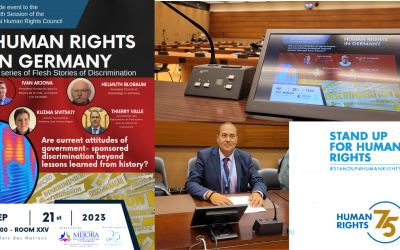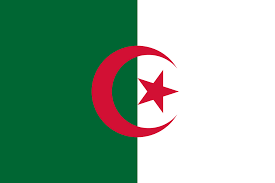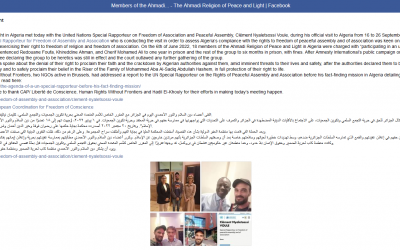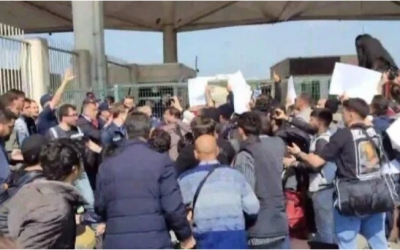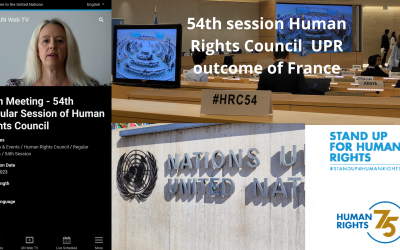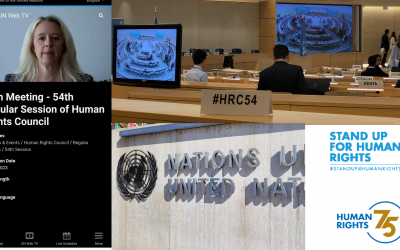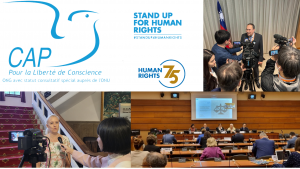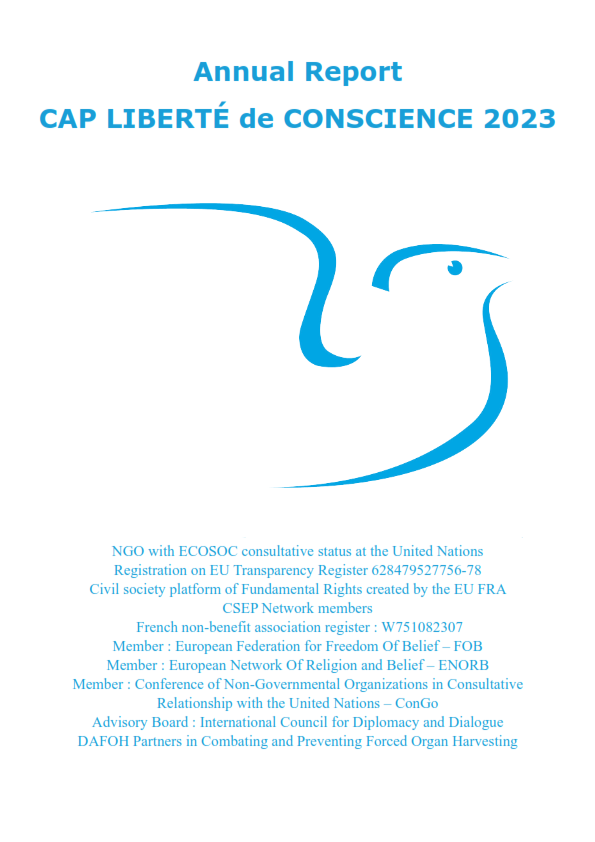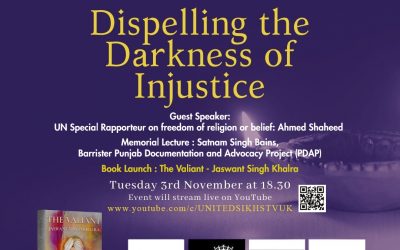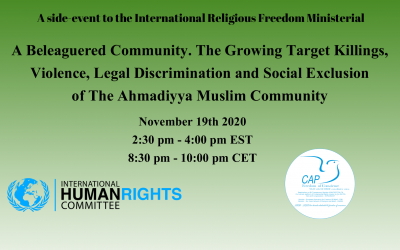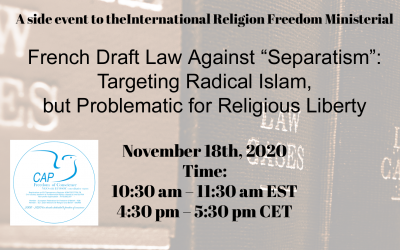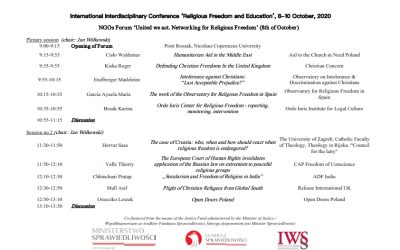
What is “Coordination des Associations et des Particuliers pour la Liberté de Conscience” (CAP Freedom of Conscience)?
CAP Freedom of Conscience is a secular European NGO with United Nations Consultative Status, created in 1995 and dedicated to protect the Right of Freedom of Religion and Belief.
CAP Freedom of Conscience combats all forms of discrimination based on religion or belief by alerting European and International bodies.
CAP Freedom of Conscience collects testimonies of discrimination and human rights violations affecting religious or belief communities in order to disseminate them to international bodies, and in order to raise awareness and inform them as well as to generate debate on the protection of Freedom of Religion and Belief.
CAP Freedom of Conscience also advocates for any religious or spiritual group facing discrimination to have their right to Freedom of Religion and Belief recognized.
CAP Freedom of Conscience is a member of the European Federation for Freedom of Belief (FOB), European Network Of Religion and Belief (ENORB) and participate to the Civil Society Platform of Fundamental Rights created by the EU Fundamental Rights Agency DAFOH Partners in Combating and Preventing Forced Organ Harvesting
Ahmadi Muslims in Germany who’ve fled state persecution are being deported back to Pakistan and it’s putting their lives at risk
Thousands of Ahmadi Muslims in Germany who have fled severe religious persecution in Pakistan are awaiting a decision on their asylum applications. They belong to a religiously and politically persecuted minority – the Ahmadiyya Muslim Community. It is recognized around the world by human rights groups that Ahmadi Muslims are constantly, ruthlessly persecuted.
Algeria : Religious freedom to be on the agenda of a UN Special Rapporteur before his fact-finding mission
HRWF/ CAP (14.09.2023) – CAP/ Liberté de Conscience and Human Rights Without Frontiers, two NGOs active in Brussels, are deeply concerned about the situation of the members of the Ahmadi Religion of Peace and Light in Algeria and have addressed a report to the UN Special Rapporteur on the Rights of Peaceful Assembly and Association before his fact-finding mission in Algeria planned from 6 to 16 September.
ALGERIA: Ahmadi Religion of Peace and Light people meet UN Special Rapporteur
Ahmadi Religion of Peace and Light (24.09.2023) – Members of the Ahmadi Religion of Peace and Light in Algeria met today with the United Nations Special Rapporteur on Freedom of Association and Peaceful Assembly, Clément Nyaletsossi Voule, during his official visit to Algeria from 16 to 26 September 2023.
Turkish court rules in favor of 101 Ahmadi religion detainees
In a side-event of the 54th session of the Human Rights Council in Germany, director of CAP Freedom of Conscience, Thierry Valle, has delivered an oral statement emphasizing the urgent need to grant asylum/humanitarian visas to the 101 members through EU consulates in Turkey as the only way available means to safeguard their right to freedom of religion and their right to life and freedom from inhumane or degrading treatment.
Oral Statement 54th session Human Rights Council UPR outcome of France
We, together with United Sikhs welcome the efforts made by France to combat stigmatization and discrimination against minorities since its last UPR.
We remain concerned about France’s policies on freedom of religion and belief, which are leading to a climate of religious intolerance, community withdrawal, hate speech and hate crimes.
As stated in our latest contribution to the OSCE 23 Report on hate crimes, the French policy act as a catalyst for intolerance, in violation of international conventions such as the Durban Declaration.
HRC 54 Item 4: IRAN General debate on the human rights situations that require the Council’s attention
We are deeply concerned about the recent transfer of 6 billion dollars in Iranian assets from South Korea to the Swiss Central Bank.
Although Reuters has reported that Iran’s use of the funds is explicitly limited to humanitarian aid, we are concerned about their misuse and are shocked that a nation that continually violates the fundamental rights of its citizens could benefit from such a substantial economic measure.
CAP Freedom of Conscience involvement in Europe
India : JASWANT SINGH KHALRA MEMORIAL LECTURE & BOOK LAUNCH 2020
JASWANT SINGH KHALRA MEMORIAL LECTURE & BOOK LAUNCH
A Beleaguered Community. The Growing Target Killings, Violence, Legal Discrimination and Social Exclusion of The Ahmadiyya Muslim Community
A Beleaguered Community. The Growing Target Killings, Violance, Legal Discrimination and Social Exclusion of The Ahmadiyya Muslim Community
International Religion Freedom Ministerial side event Separatism and Human Rights
France has a serious problem with radical Islam, but the draft law against “separatism” announced by President Macron may create more problems than it claims to solve.
Jaswant Sikh Khalra Memorial Lecture 2020 and book launch
The event will comprise an address by the UN Special Rapporteur for Freedom of Religion or Belief, a Memorial Lecture on the continuing work of Khalra and the UK launch of the highly anticipated book on Khalra’s life “The Valiant”.
FoRB Roundtable Brussels-EU
FoRB Roundtable Brussels-EU
International Interdisciplinary Conference ‘Religious Freedom and Education’, 8-10 October, 2020
THE EUROPEAN COURT OF HUMAN RIGHTS INVALIDATES APPLICATION OF THE RUSSIAN LAW ON EXTREMISM TO PEACEFUL RELIGIOUS GROUPS
In a landmark decision, Ibragim Ibragimov and others v. Russia (28 August 2018), the European Court of Human Rights has invalidated the Russian Extremism Law as far as the Law’s definition of extremism allows the ban of religious publications even in the absence of any violence or hate speech.
The decision is extremely significant as the Human Rights Court found that any application of the Extremism Law must be based on actual incitement to hatred or violence in order to justify any restriction of freedom of expression of religious beliefs.
It is also significant that the Human Rights Court rejected the national courts’ reliance and wholesale adoption of the findings of one-sided experts’ reports to rule religious publications extremist, without any meaningful and independent analysis by the courts of materials characterized as extremist by experts retained by the government. The Human Rights Court also emphasized that the civil or criminal parties must be given an opportunity to adduce counter-evidence to counter extremist charges. The total process relied on by the courts in Russia in extremist cases has constituted a breach of the equality of arms principle, a practice of Russian courts which has become systematic in the recent years.

